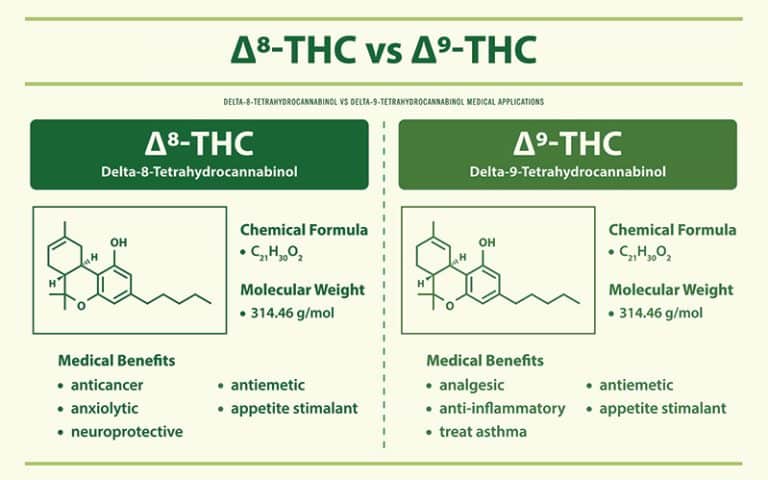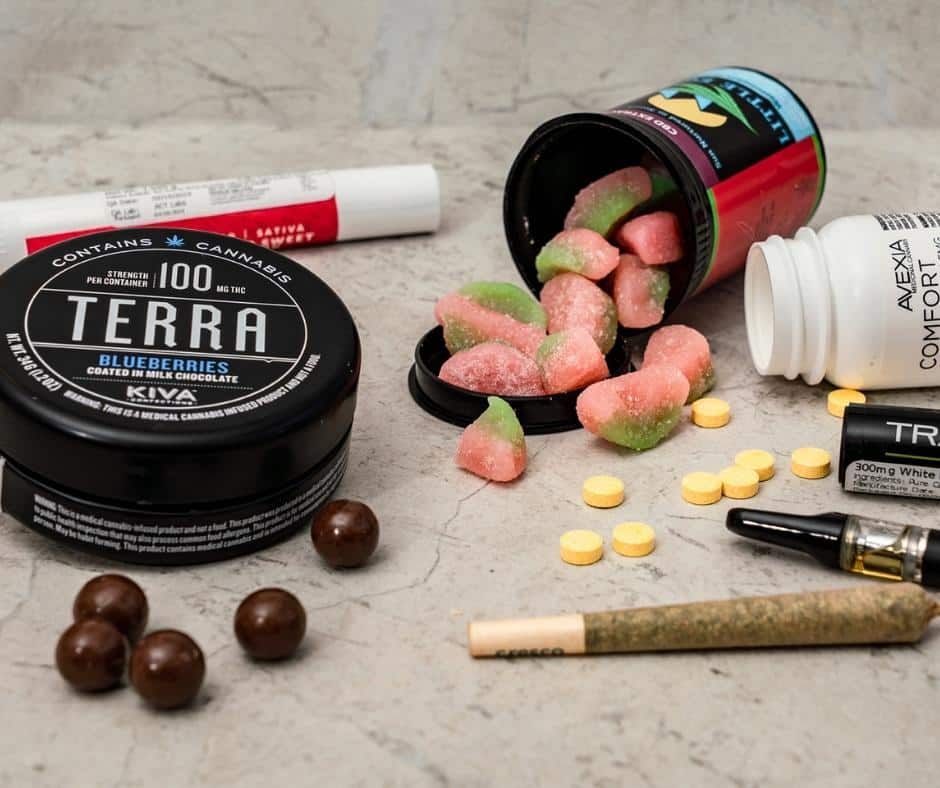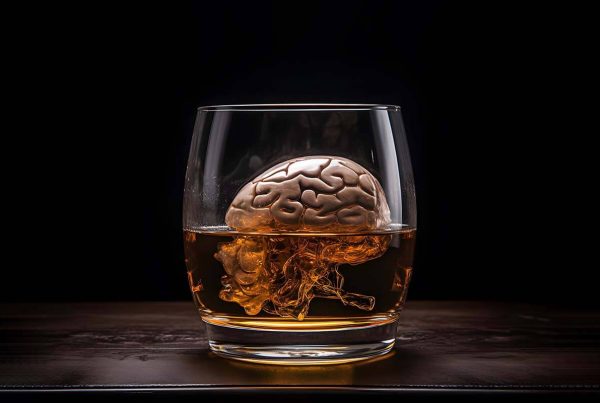What Is Delta 8 THC?
∆-8-tetrahydrocannabinol, also known as Delta 8 THC, is one of more than 100 psychoactive compounds (called cannabinoids) found in cannabis plants – which includes both marijuana and hemp. And while it does occur naturally in both, it does so only in very small amounts.
In order to concentrate it enough to be viable in things like pre-rolled smokables, gummy candies, chocolate bars, vape cartridges, tinctures, and other products currently being sold, Delta 8 THC is typically synthesized from hemp-derived cannabidiol (CBD).
And it’s a booming business. Delta 8 products are commonly sold in gas stations, convenience stores, tobacco and pipe shops, as well as cannabis dispensaries around the country. The impact on the Texas economy alone is around $51.4 million annually.
DELTA 8 VERSUS DELTA 9
If you’ve heard of THC before, chances are that you heard about ∆-9-tetrahydrocannabinol, or Delta 9 THC. This is the primary cannabinoid responsible for the high traditionally associated with marijuana.
Delta 8 is what’s called an isomer of Delta 9 THC. Isomers have the same number and type of atoms in their makeup, but they are arranged slightly differently. In the case of Delta 8 and Delta 9 THC, the only difference between the two molecules is the location of a double bond between two carbon atoms. This, in turn, gives them ever-so-slightly different properties.

WHAT DOES DELTA 8 FEEL LIKE?
Delta 8 is very similar to Delta 9 THC, both in its makeup and in its effects. Consuming it does produce a euphoria, or high, similar to that of Delta 9. However, most users describe it as less intense.
Because Delta-8 is so similar to Delta-9 , it also causes many of the same side effects, including:
- Red eyes
- Dry mouth
- Rapid heart rate
- Reduced coordination
- Slower reaction times
- Anxiety/paranoia
- Memory loss
It also claims the same or similar benefits, such as:
- Stimulated appetite
- Reductions in nausea and vomiting
- Reductions in pain and inflammation
IS DELTA 8 SAFE?
Concerns over the safety of Delta 8 stem mainly from a lack of regulation – both in how it is produced and how it is sold.
Let’s address production first. Converting CBD to Delta 8 THC involves treating it with toxic organic solvents, such as toluene or heptane, as well as highly concentrated acids and/or metals that act as catalysts. But without regulation, there is no oversight or testing to determine the pH or detect any residual metals that might be left behind.
Others worry about how the product is sold. By law, purchasers need to be 21 years old to buy products containing Delta 8 THC. However, with the wide availability of Delta 8 products, there is the worry that they will find their way into the hands of minor children and teens. In addition, the popularity of edible products (in things like candies, brownies, etc.) containing THC has led to a rise in the number of cases of children and pets consuming these products.
How is Delta 8 Legal in Texas and Other States When Marijuana Isn’t?
I am text block. Click edit button to change this text. Lorem ipsum dolor sit amet, consectetur adipiscing elit. Ut elit tellus, luctus nec ullamcorper mattis, pulvinar dapibus leo.
In 2018, President Trump signed into law the Farm Bill, which legalized all cannabis containing 0.3% or less Delta 9 THC. This created a loophole making Delta 8 THC legal as long as it’s derived from hemp containing less than 0.3% Delta 9 THC by dry weight.
In October of 2021, the Texas Department of State Health Services announced that Delta 8 THC was listed as a Schedule I controlled substance and therefore illegal. This announcement was immediately met with scrutiny by Texas hemp growers and companies that sell products containing Delta 8, who claimed that the ruling would have catastrophic consequences for the Texas hemp industry.
Consequently, in November 2021, a Texas Supreme Court judge blocked the ruling by the DSHS that Delta 8 should be considered a Schedule I substance until it is determined whether or not the state followed the law when it ruled them illegal.
As of November 2022, Delta 8 THC is currently legal in Texas.
Is there a risk of abuse or addiction to Delta 8?
I am text block. Click edit button to change this text. Lorem ipsum dolor sit amet, consectetur adipiscing elit. Ut elit tellus, luctus nec ullamcorper mattis, pulvinar dapibus leo.
Over time, those who regularly use THC of any kind will develop a tolerance to it – meaning they must consume more and more of the drug to achieve the same high. Chronic users also develop dependence, meaning that when there is no THC in their system, they will begin to experience physical withdrawal symptoms.
The symptoms of THC withdrawal are very mild compared to other drugs, leading many users and the public to believe that it isn’t addictive. In addition, depending on the frequency and amount of THC use, withdrawal symptoms may not present for up to three weeks after a person stops using.
Symptoms of THC withdrawal include:
- Troubled sleep
- Irritability
- Loss of focus
- Anxiety
- Headaches
- Depressive state
If you or a loved one needs help with substance abuse and addiction, including THC addiction, we can help. Enterhealth’s comprehensive treatment plans address both the physical aspects of addiction and the mental, emotional, and even spiritual aspects that contributed to it.
Visit our contact page or call 1.800.388.4601 day or night to learn more.




